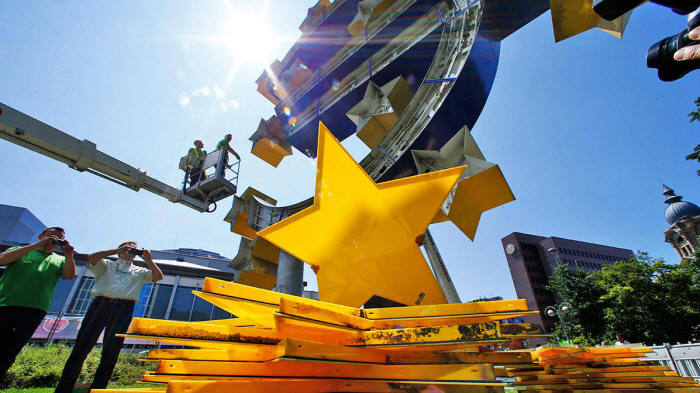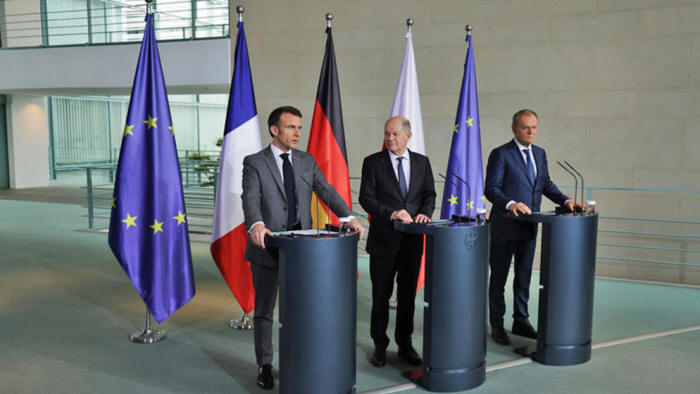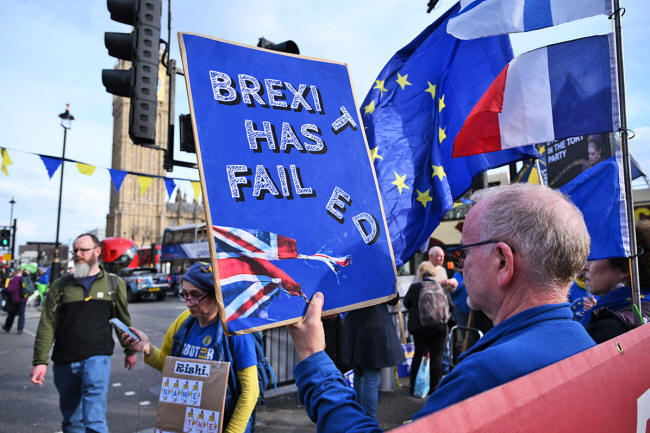|
from Profile Website
translation by
The RT Team from RT Website
©Ralph Orlowski/REUTERS Western Europe drifts, as the world rebuilds...
While the US, Russia, China, India, and even Latin America actively shape and debate their long-term direction, Western Europe remains stuck in nostalgia.
The continent's political imagination seems limited to one goal:
This backward-looking mentality has transformed the EU into what can best be described as a "terrarium of like-minded people",
In theory, the EU was designed to create a shared geopolitical force...
In practice, that unity has been reduced to cynical self-interest and mutual sabotage.
FILE PHOTO: French President Emmanuel Macron, German Chancellor Olaf Scholz, and Polish PM Donald Tusk. © Sean Gallup / Getty Images
Brussels, meanwhile, produces a steady flow of bureaucratic theater.
Figures such as Ursula von der Leyen and Kaja Kallas make loud proclamations, but everyone knows they lack real power.
Western Europe's decline didn't begin yesterday.
But the last 15 years have exposed how brittle the EU's foundations truly are.
After the Cold War, the dream of a strong, united Europe gained some traction:
A rally against Britain's exit from the European Union. The placard reads: "Brexit has failed." London, March 20, 2024.
©Cal Ford/Zuma/TASS
That dream died in Iraq in 2003, when Paris and Berlin briefly opposed Washington's invasion.
But when France rejoined NATO's command structure
in 2007, it signaled the end of any real independence. The
Americans, with British support, had reasserted dominance.
Germany imposed its will during the eurozone
crisis and the pandemic alike, and was hated for it. Smaller nations
resented their role as appendages to the German economy, with little
recourse.
France, which gave little to Kiev, now enjoys
more diplomatic prestige than Germany, which gave billions. Poland's
foreign minister practically celebrated the sabotage of Nord Stream
- not because it harmed Russia, but because it weakened Berlin.
But it failed to give Western Europe more clout with Washington.
In the end, the EU overreached,
alienated Moscow, and gained nothing substantial in return.
Western European life has become a loop of
managing decline, while tensions within the bloc grow sharper.
But it doesn't want to fight, so it pushes its continental allies to do it instead.
It's classic British strategy:
Most Germans would love to restore ties with Russia and get back to cheap energy and easy profits. But it can't.
The Americans are firmly entrenched on German soil, and Berlin's military-industrial elite wants NATO spending to continue. Southern Europe, impoverished and increasingly resentful, can no longer sustain German prosperity.
France hopes to exploit this, imagining itself as Europe's new nuclear umbrella.
Macron 'talks big,' but everyone knows he
rarely delivers...
French President Emmanuel Macron at a dinner with French and Belgian soldiers in Romania ©Abaca Press/Vostock Photo
Divide and rule is still the American
playbook, and the Western Europeans keep falling for it.
Spain and Italy, meanwhile, are refusing to see Moscow as a threat.
The European Commission, tasked with representing the EU, has become a parody of itself.
Kallas, recently named high representative for foreign affairs, immediately overstepped her role by demanding tens of billions in new aid for Ukraine.
The backlash was swift. In the EU, power over
money stays with national governments. Even von der Leyen, as
compromised as she is, knows better than to touch those coffers
without permission. What is left of Western Europe today is a political shell.
For now, the Americans hold the leash.
Only the US can impose discipline on its European satellites and give their politics a sense of direction. Russia watches all of this with measured patience.
Because ultimately, if stability returns to
Europe, it will be because Washington permits it - not because
Brussels earned it...
|





